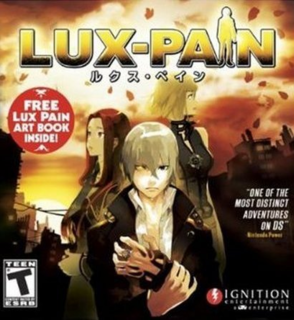Lux-Pain is more a visual novel than a game. Despite poor localization, great art and plot make the game worth playing.
You play Lux-Pain as 17 year-old Atsuki Saijo. He's got silver hair, a black trenchcoat, mismatched eyes, prosthetic limbs, a tragic past, telepathic powers, and works as the equivalent of an exorcist in a top-secret organization, FORT, that exists to protect society. Atsuki has been sent to the town of Kisaragi under the guise of a transfer student to cleanse the town of a mysterious ailment, SILENT, that causes people to have homicidal or suicidal urges.
At a first glance, Atsuki seems a little too perfect. His life seems like that of a self-insert in a very bad fanfiction. And yet, as the game plays itself out, it will occur to the player that he's really not. Atsuki has his flaws, his awkwardness, his rashness, and manages to also remain very... cool. Honestly, he's has a very successful personality that I think other main characters could learn from. But anyway-
Atsuki, with the help of FORT, researches the town and its inhabitants, and eventually finds clues that lead him to the identity of "The Original," the person from which SILENT originated. But before he can confront this person, he must cure the SILENT-infected in the city before they kill themselves or other people.
Eventually, the game ends in one of three possible sequences which are determined by your actions during the course of the game. The fact that you get some say in the outcome is nice, but no matter which ending is achieved, the game ends far too abruptly with too many unanswered questions. I found myself stunned when one second I was conversing normally with a police woman and the next the credits were rolling.
Lux-Pain does indeed have a very vague air to it. The main character's background is mentioned, but not elaborated upon. FORT and the numerous antagonists of the game are not explained. And because of poor localization, it is not even made clear exactly which side of the world the characters are on.
Ah, lol-st in translation. Dialogue is gender-confused, grammar is embarrassing, and there are a quite few "wtf lol"s to be had while playing. But that doesn't seem to get in the way of the plot, or cause confusion during gameplay. I was surprised at reviews that said otherwise.
But the biggest problem with Lux-Pain is the hulking amount of dialogue. Because it's a visual novel, this is to be expected, but it doesn't make it any less infuriating. Not being able to skip long sequences of chatter is horrible. And majority of the time, what the characters are saying is meaningless.
For people who like visual novels, or just need something time-consuming to play, Lux-Pain is for you. Everyone else, stay away. People who won't be able to take long conversations on-screen and/or lack of action should stay away from this game as though it were the plague.
I liked this game. Maybe because I don't have enough to do or I just really like the genre, but I really did like this game. The loveable characters, art, music, and plot convinced me that while Lux-Pain is not a good game, it most certainly is worth playing.

